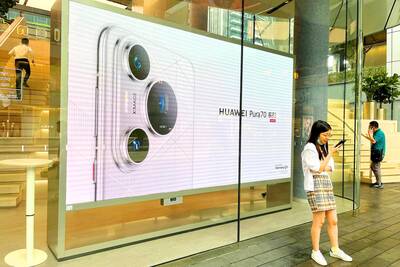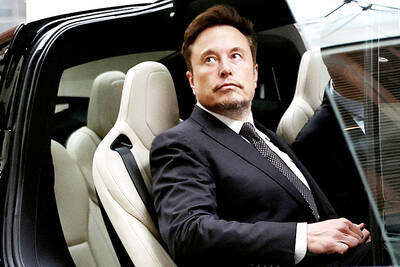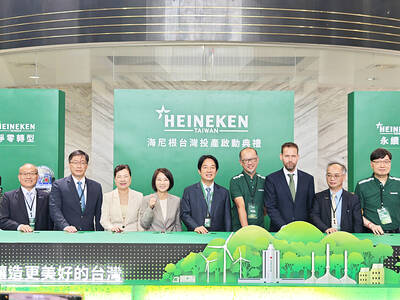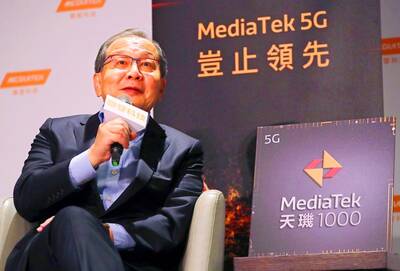The Financial Supervisory Commission (FSC) on Thursday said that it is considering allowing people to use credit cards at convenience stores to pay for the merchandise they buy online — once it finds a solution to eliminate the risks associated with money laundering.
People can pick up their online shopping at convenience stores, but they can only pay in cash, according to the regulations.
“It is hard for convenience stores, which help collect and transfer money for online shopping platforms, to conduct consumer due diligence, but banks think that this might create a loophole for money laundering,” Banking Bureau Deputy Director Sherri Chuang (莊琇媛) told a news conference in New Taipei City, adding that the use of cash bears less risk.
The commission has asked the Bankers Association of the Republic of China to consider the issue and find a solution to reduce the risk of money laundering, Chuang said.
The commission also said that people can again use credit cards to pay taxes, fines and utility fees at convenience stores, which was banned earlier this year due to concerns over money laundering.
The commission lifted the ban after banks said that the transactions bear little risk of money laundering, as their recipients are government or state-run companies, Chuang said.
The commission said it hopes to raise the penetration of credit card payments at convenience stores and expects to see their use in mobile payment.
The limit on cash payments at convenience stores is NT$20,000, but the restriction does not apply to people paying taxes, fines or fees using credit cards, the commission said.
Taiwanese have been allowed to use stored-value cards to pay fees since 2015, as these bear less risk, it added.

Huawei Technologies Co’s (華為) latest smartphones carry a version of the advanced made-in-China processor it revealed last year, results from an independent analysis showed. This underscored the Chinese company’s ability to sustain production of the controversial chip. The Pura 70 series unveiled last week sports the Kirin 9010 processor, research firm TechInsights found during a teardown of the device. This is a newer version of the Kirin 9000s, made by Semiconductor Manufacturing International Corp (SMIC, 中芯) for the Mate 60 Pro, which had alarmed officials in Washington who thought a 7-nanometer chip was beyond China’s capabilities. Huawei has enjoyed a resurgence since

purpose: Tesla’s CEO sought to meet senior Chinese officials to discuss the rollout of its ‘full self-driving’ software in China and approval to transfer data they had collected Tesla Inc CEO Elon Musk arrived in Beijing yesterday on an unannounced visit, where he is expected to meet senior officials to discuss the rollout of "full self-driving" (FSD) software and permission to transfer data overseas, according to a person with knowledge of the matter. Chinese state media reported that he met Premier Li Qiang (李強) in Beijing, during which Li told Musk that Tesla's development in China could be regarded as a successful example of US-China economic and trade cooperation. Musk confirmed his meeting with the premier yesterday with a post on social media platform X. "Honored to meet with Premier Li

Dutch brewing company Heineken NV on Friday announced an investment of NT$13.5 billion (US$414.62 million) over the next five years in Taiwan. The first multinational brewing company to operate in Taiwan, Heineken made the statement at a ceremony held at its brewery in Pingtung County. It also outlined its efforts to make the brewery “net zero” by 2030. Heineken has been in the Taiwanese market for 20 years, Heineken Taiwan managing director Jeff Wu (吳建甫) said. With strong support from local consumers, the Dutch brewery decided to transition from sales to manufacturing in the country, Wu said. Heineken assumed majority ownership and management rights

GROWTH DRIVERS: The firm expects to benefit from generative AI applications for smartphones, higher average selling price of flagship chips and market share gains Smartphone chip designer MediaTek Inc (聯發科) yesterday said it estimates that revenue would expand at an annual rate of about 15 percent this year, as a proliferation of generative artificial intelligence (AI) applications for premium smartphones are fueling demand for its flagship smartphone chips. It expects its smartphone chip revenue to outgrow the company’s average growth rate this year, benefiting primarily from the higher average selling price of its flagship smartphone chips and market share gains. The flagship chip revenue is to soar 50 percent year-on-year this year, MediaTek told an investor conference yesterday. As a whole, this year’s gross margin is